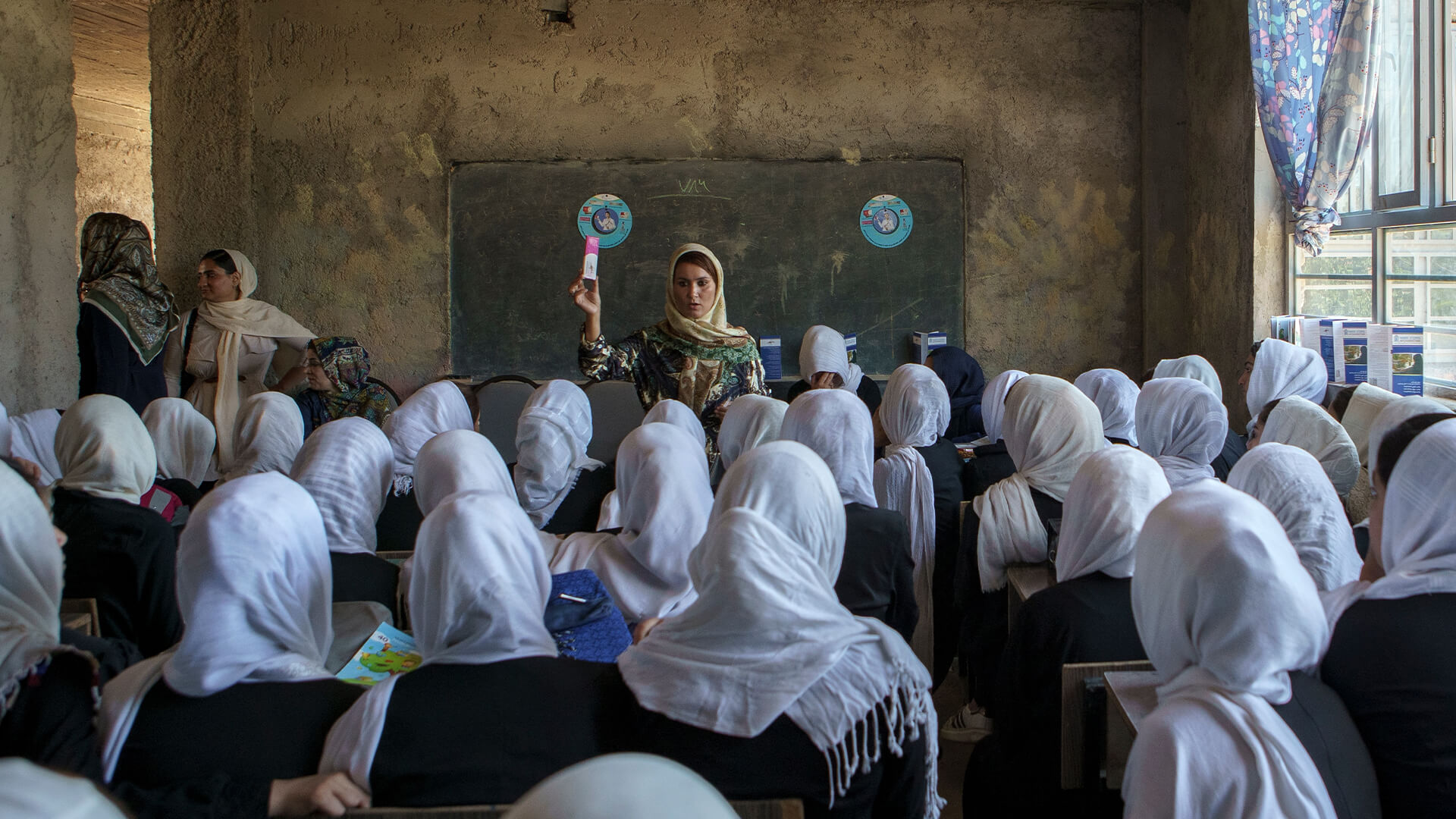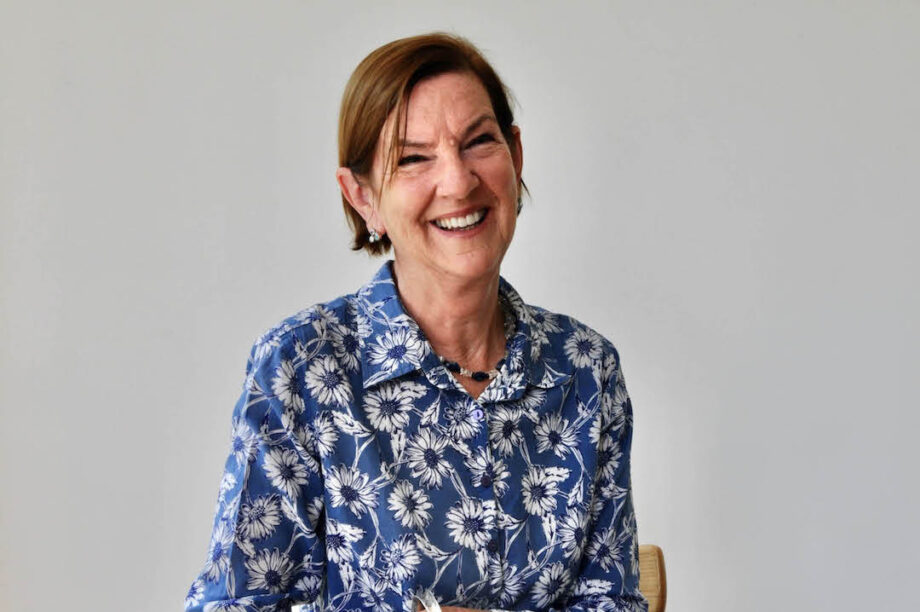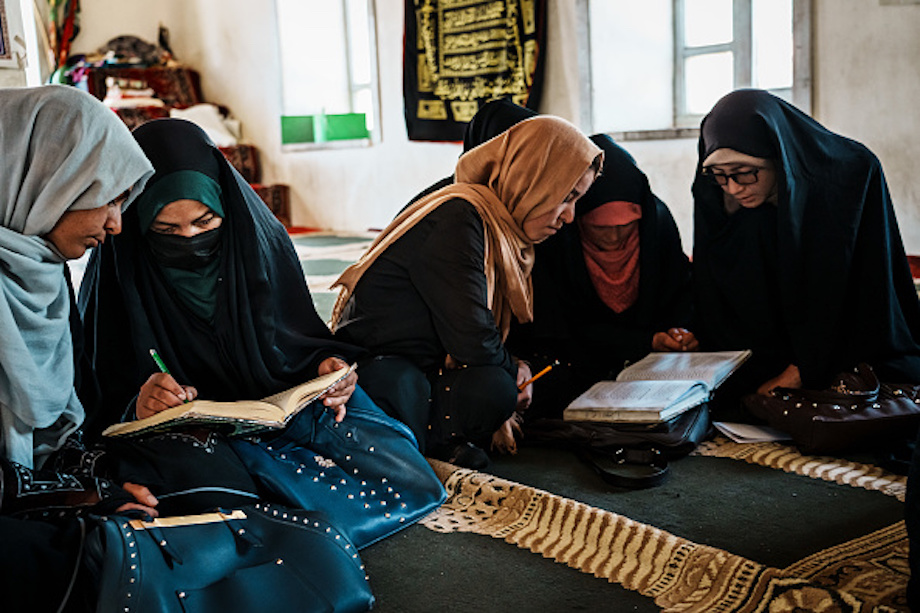
In this issue
Mentoring from a conflict zone: Elise & Gérald: Alumni Mentoring
Many alumni benefit from remote mentoring, with participants joining us from all corners of the world. In this issue, we...

Read time: 6 mins
Image caption: Afghan girls at school in Herat, Afghanistan, in 2019
King’s alumna, Jane Conway (MA Life Writing, 2003), is helping women in Afghanistan and those displaced in Iran to keep in touch with their education through English classes and by empowering them to tell their stories of resistance. Jane plans to share the stories that she has helped her students write as part of an anthology. She hopes that it will raise awareness of the hardship Afghan women are experiencing and inspire others to keep their aspirations alive.
Since the Taliban returned to power, gender-based discrimination against women and girls has worsened; they are now barred from most areas of public life, including many educational spaces. Shortly after the fall of Kabul, the Taliban prohibited school attendance beyond the sixth grade, leaving 1.1 million girls over the age of 12 without access to formal education. Then, in December 2022, the Taliban’s Higher Education Minister ordered the suspension of university education for women at all public and private higher education institutions, crushing the hopes of over 100,000 students.
Afghan girls and women who have sought sanctuary in neighbouring countries are reportedly also facing barriers when trying to access education, further limiting opportunities for them to continue their academic journeys. In response, many brave Afghan girls and women are attending underground schools or classes online, including the individuals that Jane Conway has been supporting.
Together, we will break down the barriers that prevent women from achieving their full potential, and we will emerge victorious like the break of dawn.
Excerpt from a story written by one of Jane’s students

Jane Conway (MA Life Writing, 2003)
While undertaking her master’s in Life Writing at King’s, Jane also worked for Westminster Adult Education Service, teaching English for Speakers of Other Languages (ESOL). Many of Jane’s ESOL students were refugees who had fled war and conflict, leaving behind their family, friends, homes and careers to start all over again in another country.
Jane explains, ‘Already traumatised by experiences of war and the forced upheaval of their lives, these ESOL students faced many new problems in their resettlement, such as inadequate living conditions, poverty and depression caused by loss of identity and homesickness. Their situations were often exacerbated by their lack of English and ability to communicate their needs or negotiate their way in an unfamiliar world. Learning English is a vital pathway to integration and opportunities.’
The majority of students in Jane’s community classes were women, some of whom had never received formal schooling and were not literate in their first language. However, through the opportunity to study, Jane’s students soon made significant progress in learning how to read and write in English, with many advancing to higher-level classes and eventually to vocational training and fulfilling employment.
Jane’s background in teaching refugees led her to Save Afghan Women, an NGO that was set up in August 2021 (after the Taliban seized power) to defend the rights of Afghan women and children and to provide them with online education. Initially, Jane’s role was to prepare a group of women aged 16–24, who were either in Afghanistan or displaced in Iran, for the speaking component of the International English Language Testing System (IELTS). Jane started weekly online classes and bespoke individual lessons to support the women in their progress, providing learning opportunities as well as much-needed social contact.
Jane says, ‘The women are very isolated, and the weekly class acts as a forum to share stories and news and to talk about their hopes for the future. From the time I became involved in teaching the group, I witnessed their growing despair as more and more of their rights and freedoms were closed down.
‘Even the objective that the women could take the IELTS exam became abstract as all centres to sit it were closed and the teachers had fled the country or were in hiding. Yet the incentive for the women to improve their academic English skills remains. Improved English supports their dreams of scholarships to attend universities outside Afghanistan and helps them hold on to their plans to have the careers they were looking forward to before the Taliban arrived.’
The women in Jane’s classes all have a strong desire to contribute to their communities and the country through fulfilling jobs. So, in addition to helping them improve their English, Jane has been carefully matching the women with mentors in their chosen field who can keep them up to date on the latest developments and stimulate their interest through conversation.
Jane is now returning to her connection with King’s by working with Save Afghan Women and the King’s Sanctuary Programme to extend this mentoring scheme. This will mean more support can be provided for the many women whose careers and studies have been abruptly ended.

It is not just the King’s Sanctuary Programme that is influencing Jane’s work with Afghan women. Having realised that many of the women in her classes needed an outlet for the hardships they have endured, Jane has been drawing on her master’s degree to support them to write about their personal experiences, emotions and opinions.
‘There is a link to be made between my MA and my teaching work with refugees. The common feature is my interest in people’s stories, and what we can learn from them about human nature. The women I teach feel forgotten by the world and silenced. To amplify their voices, I encouraged them to write about their experiences. Putting their thoughts and feelings into words has been cathartic and empowering for them, an act of rebellion in giving them a way to be heard. Their powerful stories have in common the strength of their resistance to repression, and how they look to an educational ladder to escape their situation and have the chance of a career.’
The stories that Jane’s students produced prompted her to collect more stories from women who are in Afghanistan or forcibly displaced in Iran, including academics and teachers who are in hiding. Jane plans to produce an anthology of these stories to be sold in the UK, with the aim of raising awareness of the difficulties that many Afghan women are currently enduring. Her hope is to inspire other women to keep their aspirations alive, and to encourage others to raise funds for university scholarships so that the women can continue their academic journeys. You can read four of the women’s stories below.
‘Understanding the experiences of others, especially when remote from our own, teaches compassion and breaks down barriers of racial and class division. Journeys of hardship and suffering are stories to be shared, and if we are prepared to listen to them, we are invested with empathetic insights that create an inclusive, collective desire to reach out, rather than look the other way.’
The women I teach feel forgotten by the world and silenced. To amplify their voices, I encouraged them to write about their experiences. Putting their thoughts and feelings into words has been cathartic and empowering for them, an act of rebellion in giving them a way to be heard.
A collection of stories written by women who are in Afghanistan or forcibly displaced in Iran. These stories will form part of an anthology being collected by Jane Conway (MA Life Writing, 2003) that aims to raise awareness of the hardships that many Afghan women are experiencing. Her hope is to inspire other women to keep their aspirations alive, and to encourage others to raise funds for university scholarships so that the women can continue their academic journeys.
Have you ever seen a country that hinders its own progress, destroys its treasures with its own hands, is satisfied with the persecution of its people, brainwashes young men into committing acts of extreme violence for religious ideology and always discriminates against its women, seeing their only role and duty in life is to give birth and satisfy the sexual needs of men? Read more…
As a young woman from Afghanistan, I have experienced first-hand the inequality and injustice that exists in our society. Despite my desire to pursue an education, I have been denied this opportunity simply because of my gender. While my brothers were able to attend school and pursue their dreams, I was left behind, feeling frustrated and heartbroken. Read more…
I started my life in a small family in rural Afghanistan. My family contained three people: me, my father and my mother. My parents lost their first child. I am their second child. I am also the first person in my family who went to school. When I started going to school, my father was in Iran working to provide for his family. The situation was very difficult for us. Read more…
I am a human being. A human being who is condemned to the weaker sex because of gender; a human being without the right to freedom, without the right to education, without the right to raise their voice when their rights are violated and without the right to choose a spouse; and a human being who is forced to bow down to the desires and thoughts of a few men who consider themselves the best creatures of God. Read more…
Journeys of hardship and suffering are stories to be shared, and if we are prepared to listen to them, we are invested with empathetic insights that create an inclusive, collective desire to reach out, rather than look the other way.
Today, more than 100 million people are
forcefully displaced worldwide. The King’s Sanctuary Programme is a sector-leading initiative that brings together education, research and impact to tackle this pressing global challenge.
Find out more about the
King’s Sanctuary Programme.

Many alumni benefit from remote mentoring, with participants joining us from all corners of the world. In this issue, we...

2020 marked 50 years since the Equal Pay Act was brought into law in the UK. Looking back to 1970,...